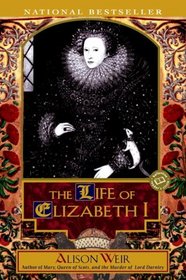Helpful Score: 4
A nice overview of Elizabeth's life. If you've read another book about the life of Elizabeth, there really isn't any need to read this one, as Weir has very little new to say about her. But if the topic isn't one you've read about, this could be a good first look at Elizabeth's life.
If you are familiar with Elizabeth already, the biography by J.E. Neale or Anne Somerset would be more interesting and informative.
If you are familiar with Elizabeth already, the biography by J.E. Neale or Anne Somerset would be more interesting and informative.
Helpful Score: 2
Loved, loved, loved it! Took me a WEEK to read, but I thoroughly enjoyed it. Not as breezy as David Starkey (who I am now reading), but quite a thorough examination. Will definitely read more by Ms. Weir.
Helpful Score: 2
As a historian and avid reader, I found this volume to be a jewel. Elizabeth Tudor has been written about to the point of being overdone but Weir's biographical account is refreshing in the face of so much redundant scholarship. This reads like a novel but Weir manages to maintain excellent standards of accuracy. This book is great.
Helpful Score: 1
The long life and powerful personality of England's beloved Virgin Queen have eternal appeal, and popular historian Alison Weir depicts both with panache. She's especially good at evoking the physical texture of Tudor England: the elaborate royal gowns (actually an intricate assembly of separate fabric panels buttoned together over linen shifts), the luxurious but unhygienic palaces (Elizabeth got the only "close stool"; most members of her retinue relieved themselves in the courtyards), the huge meals heavily seasoned to disguise the taste of spoiled meat. Against this earthy backdrop, Elizabeth's intelligence and formidable political skills stand in vivid relief. She may have been autocratic, devious, even deceptive, but these traits were required to perform a 45-year tightrope walk between the two great powers of Europe, France and Spain. Both countries were eager to bring small, weak England under their sway and to safely marry off its inconveniently independent queen. Weir emphasizes Elizabeth's precarious position as a ruling woman in a man's world, suggesting plausibly that the single life was personally appealing as well as politically expedient for someone who had seen many ambitious ladies--including her own mother--ruined and even executed for just the appearance of sexual indiscretions. The author's evaluations of such key figures in Elizabeth's reign as the Earl of Leicester (arguably the only man she ever loved) and William Cecil (her most trusted adviser) are equally cogent and respectful of psychological complexity. Weir does a fine job of retelling this always-popular story for a new generation.
Helpful Score: 1
I love this author, and I find her books to be well researched. Her writing is very engaging.





![header=[] body=[Get a free book credit right now by joining the club and listing 5 books you have and are willing to share with other members!] Help icon](/images/question.gif?v=5fea88b8)
